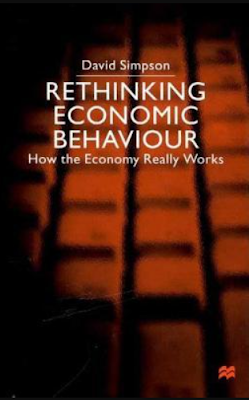All the coin of the Kingdom belongs to the State, represented in France by the King: it belongs to him in precisely the same way as the high roads do, not that he may appropriate them as his own property, but in order to prevent others doing so; and as it is one of the rights of the King, and of the King alone, to make changes in the highways for the benefit of the public, of which he (or his officers) is the sole judge, so it is also one of his rights to change the gold or silver coin into other exchange tokens, of greater benefit to the public. . . .
Friday, July 17, 2020
For John Law, Money Is an “Instrument” That Is Deliberately Designed to Achieve the “Policy Goals” of Government Planners
Although the Demand for Money Can Be Defined as a FLOW or as a STOCK, We Will Use the Stock or Cash Balances Definition
Wednesday, July 15, 2020
The Static State Can Dispense with Economic Calculation But a Static State Is Impossible in Real Life
Calculation “In Natura,” In an Economy Without Exchange, Can Embrace Consumption Goods Only and Completely Fails with Goods of a Higher Order
A Consistent Macroeconomic Approach Would Have to Shun Any Reference to Prices and to Money
Tuesday, July 14, 2020
This Is Not Science — It Is Witchcraft! Seeing How Bad Econometric Forecasting Is
Econometrics Has Been a Success Only in the Limited Sense That It Can Be Used to Prove Almost Anything
Monday, July 13, 2020
Anglo-American Economists Are Living in Their Dream World and Are Ignorant of the History of Economic Thought
Forecasting Mania Is an Integral Part of “Functional Finance,” the “Multiplier Effect” and the “Acceleration Principle”
After Seeing Numerous Forecasting Failures in the 1940s and 1950s, Dr. Hahn Proposed a “Law of the Necessity of Errors in Forecasting”
To Apply to Economics Methods of Analysis Drawn from Physics Was Itself an Unscientific Procedure
The Method of Reasoning Employed by the Neoclassical School Is Essentially the Same As That Followed by Ricardo
The method of reasoning employed by the neoclassical school is essentially the same as the procedure followed by Ricardo as described by Schumpeter:
This is the method of analysis which proceeds by excluding as many variables as possible. Then, for the rest, piling one simplifying assumption upon another until, having really settled everything by these assumptions, he [Ricardo] was left with only a few aggregative variables between which, given these assumptions, he set up simple one-way relations so that in the end, the desired results emerged almost as tautologies.⁴
Nevertheless, it was hailed by almost all professional economists as being a triumph for economic theory when in 1964 it was shown that, given specified endowments of resources, technology and consumer preferences, a system of competitive markets could in a logical sense be proved to exist. This triumph was only slightly marred by the fact that its proponents themselves were divided on its interpretation. Since it was recognised that the result had been achieved by making such drastic simplifications and such sweeping exclusions as were not remotely attainable in practice, did it mean that a real world market economy could work, or did it mean that it could not work?
__________
⁴Schumpeter continued: ‘The habit of applying results of this character to the solution of practical problems we shall call “The Ricardian Vice”’.
Sunday, July 12, 2020
It Is “In Principle” Impossible to Use Economic Theory and Statistics to Make Economic Forecasts
Thus was it “in principle” impossible to use economic theory and statistics to make economic forecasts. He based this claim on arguments concerning economic data, processes, and actors. The lack of homogeneity and the small size of samples made data wholly inadequate for statistical induction. Contrary to in the natural sciences, the data problems of economics were so significant as to render futile any attempt to apply probability methods. As for economic processes, Morgenstern held that attempts to understand the business cycle based on statistical considerations alone could never facilitate economic forecasting. For that, one needed to look to the underlying processes, of which prices were the surface phenomena. These mechanisms, however, lacked the regularity necessary to make them useful for any kind of prediction: only loose and inexact laws could be discovered. Finally, even when predictions were made, their effect was to create anticipations on the part of consumers, the reactions of whom would only serve to make the original forecast false. Unlike astronomy or medicine, the social sciences had the peculiarity of being able to affect their object of study. The prediction of the astronomer could have no effect on the movement of the stars, but that of the economist could change economic events. Morgenstern’s criticism of static theory is thoroughly Misesian: “In the static economy, nobody acts economically any more, and that means that they no longer ascribe value, and that no more acts of choice are made, and no decisions are made, because everything stands still.”
—Robert Leonard, Von Neumann, Morgenstern, and the Creation of Game Theory: From Chess to Social Science, 1900-1960, Historical Perspectives on Modern Economics (New York: Cambridge University Press, 2010), 101.














